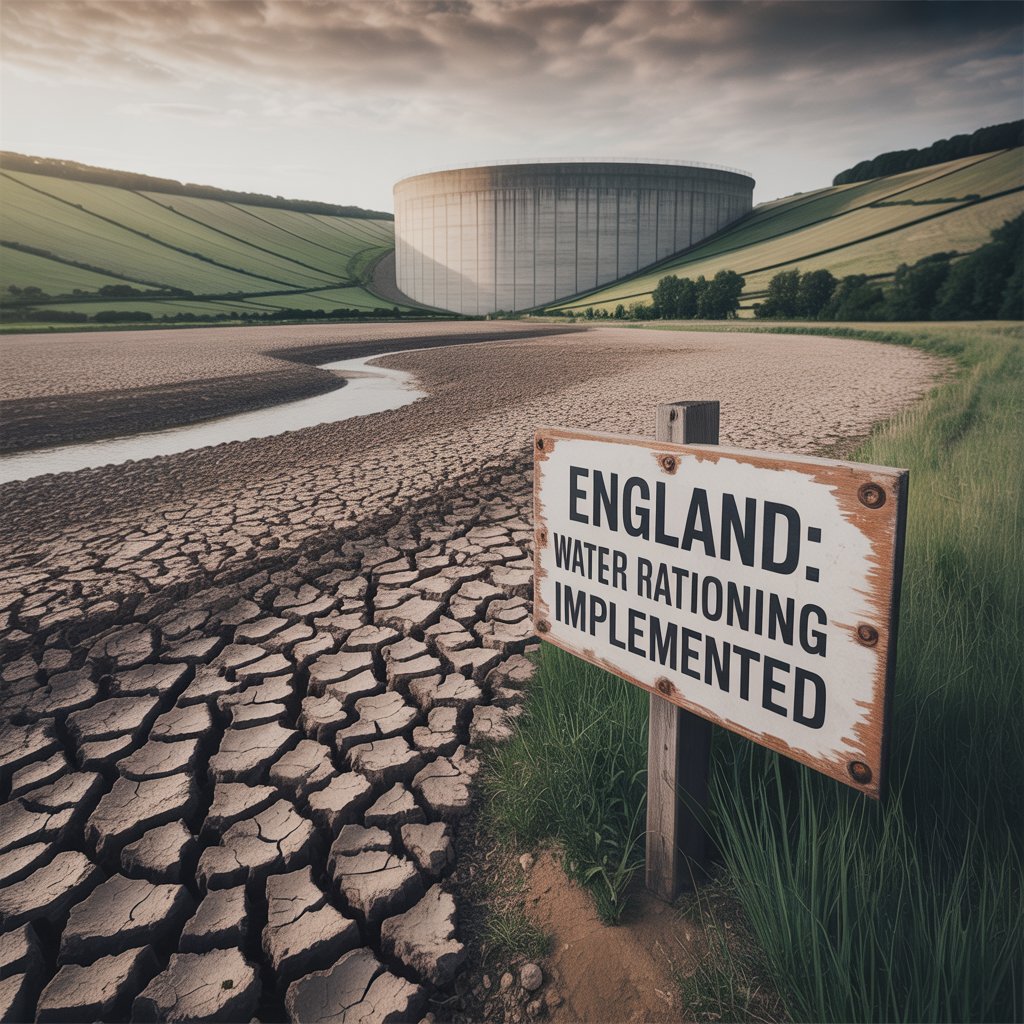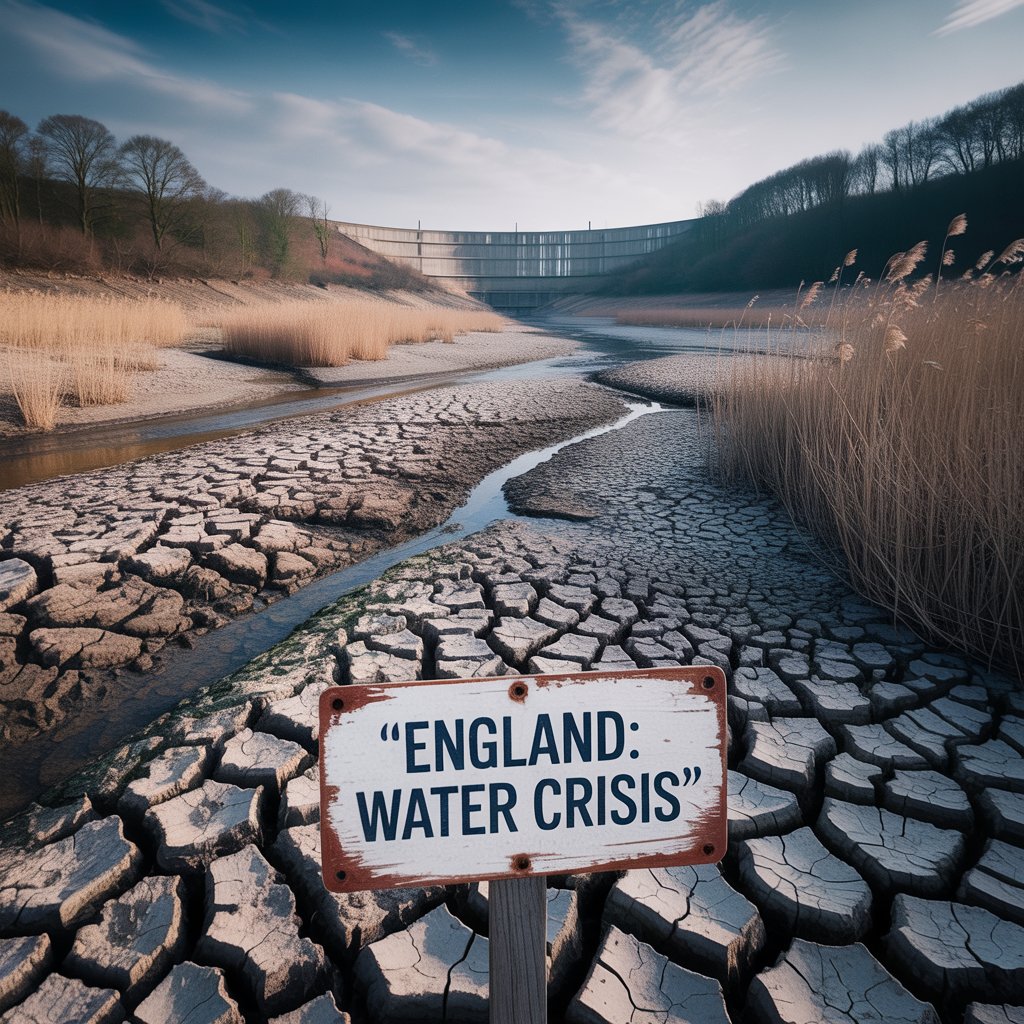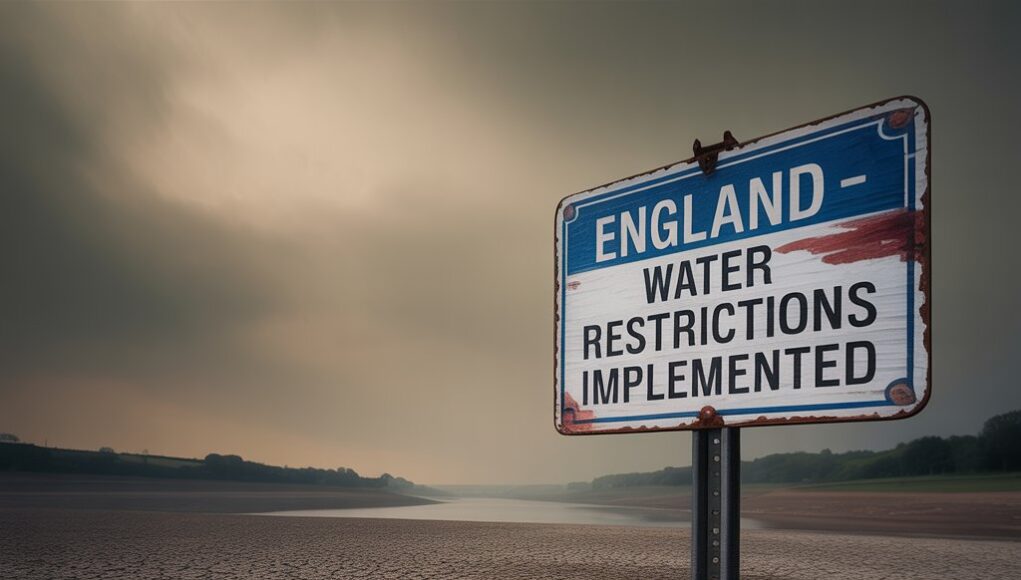Introduction:
The country faces serious danger, as experts warn that England could suffer from a drinking water shortage within ten years unless leaders find urgent solutions.A government minister has said we need new reservoirs and better infrastructure to make sure we never face a catastrophic water shortage.
It is cautioned by experts that England could run out of drinking water within the next ten years unless urgent actions are taken.
England Could Face a Drinking Water Shortage Over the Next Ten Years
1: Rising Demand and Population Growth
Because England’s population is rising, more freshwater is needed. The Environment Agency warns that water demand could be as much as 3.4 billion liters higher than supply by 2050, if nothing is done.
2: Climate Change and Droughts
The increasing droughts brought by climate change are lowering the amount of water we have. The UK’s National Infrastructure Commission says England is likely to face water supply problems in future years.
3: Aging Water Infrastructure
Most of England’s water supply system is quite old, meaning that lots of water is lost because of leaks. A large number of experts say that water leaks lead to the waste of 3 billion liters every single day.
4: Lack of New Reservoirs
Most of England’s water supply system is quite old, meaning that lots of water is lost because of leaks. A large number of experts say that water leaks lead to the waste of 3 billion liters every single day.
England must build new reservoirs as soon as possible, warns the government.
If additional reservoirs and measures to reduce water usage are not put in place soon, researchers warn England could face a shortage of drinking water within a decade.

Key Government Proposals:
- Expanding Reservoir Capacity – Designs for new reservoirs in Oxfordshire, Lincolnshire and Cambridgeshire.
- Minimizing Water Leakage – Water companies are required by stronger regulations to reduce leaks by half.
- Promoting Water Efficiency – Offering bonuses for businesses and households to use less water.
England Could Run Out of Drinking Water in a Decade Without New Reservoirs, Minister Says: What That Means:
Steve Barclay, the Environment Minister, urged people to take action now to prevent future supply problems. The statement has made environmental groups and water companies more concerned.
Key Points from the Minister’s Warning:
- No major reservoirs have been constructed in England since the 1990s.
- Both domestic and industrial uses of water are increasing every day.
- Urgent action is needed right now to prepare for future drought risks.
LSI Keywords That Shed Light on the Issue:
It’s important to look at terms that similarly affect water storage when studying why England is losing its drinking water.
- There isn’t enough water in the UK.
- There is drought in England.
- Planning for reservoirs in the United Kingdom
- Water and climate change
- Rules for saving water in the UK
7 Urgent Reasons Why England Must Act Now:
1: Increased Frequency of Droughts:
England has seen some of its driest summers ever in the past few years. If we do not build new water storage, coping with dry periods is very difficult.
2: Rising Demand with Urban Expansion:
Water utilities have to prepare for the water needs of today and tomorrow.
3: Environmental Degradation:
Removing too much water from rivers and aquifers hurts both ecosystems and the variety of living things in them.
4: Insufficient National Water Strategy:
In spite of warnings, changes at the national level in water policy are moving slowly.
5: Public Apathy and Lack of Awareness:
Most people do not see water conservation as an important issue, surveys reveal.
6: Technological Gaps:
Both smart metering and water recycling are being used less than they could be.
7: Lack of Long-Term Investments:
Companies in the water industry tend to concentrate on temporary solutions instead of making long-term improvements to infrastructure.

Table: Important Factors Affecting England’s Water Supply:
| Factor | Impact Description |
|---|---|
| Climate Change | Reduced rainfall, increased droughts |
| Population Growth | Higher domestic and commercial water use |
| Infrastructure Decay | Leakage, inefficiencies |
| Policy Inaction | Delay in reservoir and recycling projects |
| Regional Imbalances | Southeastern water stress |
The Path Forward: A Collaborative Effort:
Preventing England from running out of water in the next decade is only possible if the government, water companies, regulators, businesses and people all work together.
Government Leadership and Policy:
:For investment to happen, the government needs to guide the process by setting clear objectives, organizing planning and giving the right rules and financial support. The “National Framework for Water Resources” explains what England needs in terms of water and the scale of effort required.
Water Industry Accountability:
For investment to happen, the government needs to guide the process by setting clear objectives, organizing planning and giving the right rules and financial support. The “National Framework for Water Resources” explains what England needs in terms of water and the scale of effort required.
Business and Industry Responsibility:
Businesses should use sustainable water methods, seek ways to recycle water and reduce their use of water in industrial activities UK.
Individual Action:
Every person can take actions each day to help save water. A series of small actions can really add up.
Frequently Asked Questions (FAQs):
Q1: Is there a real danger that England could face a shortage of drinking water?
Ans1: According to a government minister, England could face a shortage of drinking water within the next decade if more reservoirs are not built. It is also based on predictions from the Environment Agency that by 2050, climate change, population growth and problems with infrastructure will lead to a major water deficit.
Q2: Despite the rain, England is struggling with water shortages?
Ans2: Although England gets rain, climate change is making rainfall patterns different, leading to both heavier and less common showers and longer periods without rain. It is difficult for the current infrastructure to hold and manage this water, so a lot is wasted through leaks.
Q3: What are LSI Keywords and what makes them important?
Ans3: LSI (Latent Semantic Indexing) Keywords are terms that have the same meaning as your main keyword. They add more meaning to your content which makes it easier to find and more relevant for search engines.
Q4: How fast can we build new reservoirs?
Ans4: It can take over a decade from when a new reservoir is planned until it is completed, even when processes are rushed. Therefore, handling existing infrastructure and demand right away is very important.
Q5:What steps can people take to conserve water?
Ans5: You can help a lot by showering briefly, repairing leaks, turning off the taps when brushing teeth, using dishwashers and washing machines only when they are full and collecting rainwater for your garden.
Q6: What actions is the government taking to solve the water problem?
The government is taking steps to speed up planning for new reservoirs, set tough goals for reducing leaks and water used by each person and persuade water companies to invest in strong infrastructure and ways to manage water use.
Conclusion: England drinking water shortage
The minister believes that England may not have enough drinking water in 10 years which requires immediate action. Although new reservoirs are important, they do not address all the problems.













https://shorturl.fm/9fnIC
https://shorturl.fm/N6nl1
https://shorturl.fm/bODKa
https://shorturl.fm/bODKa
https://shorturl.fm/5JO3e
https://shorturl.fm/0oNbA
https://shorturl.fm/0EtO1
https://shorturl.fm/eAlmd
https://shorturl.fm/LdPUr
https://shorturl.fm/LdPUr
https://shorturl.fm/JtG9d
https://shorturl.fm/JtG9d
https://shorturl.fm/xlGWd
https://shorturl.fm/I3T8M
https://shorturl.fm/ypgnt
888starz uz skachat http://www.888starz-official.com .
цены на охранные услуги http://rabochiy.site/ .
охрана в москве стоимость http://www.rabochiy.site .
https://tokarnye-stanki-s-chpu.ru/ – станок токарный с чпу купить — это современное оборудование для точной обработки металла и дерева.
Такое оборудование обеспечивает точное и быстрое изготовление деталей из различных материалов.
Автоматизация токарных работ минимизирует человеческий фактор и ускоряет выполнение задач. Сегодня станки с ЧПУ используются в машиностроении, авиации и других отраслях промышленности.
#### **2. Принцип работы токарных станков с ЧПУ**
Работа оборудования строится на заранее созданной программе, определяющей последовательность обработки.
Специальные датчики контролируют точность выполнения операций. В результате производитель получает детали с минимальными допусками и высокой чистотой поверхности.
#### **3. Преимущества токарных станков с ЧПУ**
Одним из ключевых плюсов считается снижение зависимости от человеческого фактора.
Автоматизация процесса позволяет сократить производственные издержки. Также оборудование легко адаптируется под изготовление разных деталей без длительной переналадки.
#### **4. Перспективы развития токарных станков с ЧПУ**
В будущем ожидается увеличение степени автоматизации и интеграция искусственного интеллекта.
Использование облачных технологий упростит управление и диагностику оборудования. Это откроет новые возможности для промышленности и ускорит переход к «умным» заводам.
—
### **Спин-шаблон:**
#### **1. Введение в токарные станки с ЧПУ**
Обрабатывающие центры с ЧПУ стали неотъемлемой частью современного производства. Машины с числовым программным управлением значительно упрощают процесс обработки деталей.
Автоматизация токарных работ минимизирует человеческий фактор и ускоряет выполнение задач. Подобные агрегаты востребованы в автомобильной, медицинской и энергетической сферах.
*(Шаблон продолжается аналогично для всех последующих разделов.)*
Получите бесплатный вопрос юристу по телефону прямо сейчас!
поддержки правовых норм. Непонимание юридических нюансов может негативно сказаться на жизни граждан.
Первенствующий вопрос, который необходимо рассмотреть, — это доступ к юридическим консультациям. Сегодня многие юристы предлагают услуги онлайн. Такой подход значительно облегчает получение правовой помощи.
Следующий важный момент — это выбор юриста. Надежный юрист должен иметь соответствующий опыт и образование. Люди часто игнорируют эти факторы, что может привести к неудачам.
Немаловажным моментом является финансовая сторона вопроса юридических услуг. Цены могут варьироваться в зависимости от сложности дела и репутации юриста. Необходимо детально обговорить все финансовые аспекты до начала сотрудничества.
Не забывайте, что каждый юрист должен быть ответственен за предоставляемые услуги. Отсутствие должного уровня компетенции может иметь серьезные последствия для клиента. Качественный юрист — это залог успешного решения задач.
Получите квалифицированную бесплатного юриста консультацию онлайн.
На yuridicheskaya-konsultaciya23.ru вы можете задать все интересующие вас вопросы.